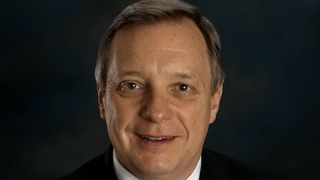Durbin: Broadcasters Are Key Defense Against Press Threats

Sen. Dick Durbin (D-Ill.) took aim at President Donald Trump's attacks on the mainstream media Tuesday, signaling they were part of an assault on the media from without and within that threatened "the survival of journalism as a critical pillar of Democracy."
He branded the President's attacks on media as enemies as the tactics of strongmen to maintain power by silencing their critics.
Durbin was speaking to a roomful of radio and TV broadcasters at the National Association of Broadcasters State Leadership Conference in Washington, D.C. He drew a standing ovation for his remarks, which were sharply critical of the President.
"The kinds of attacks on the media that we are seeing in America today would have seemed familiar 30 years ago in Ukraine or the Baltics, when those nations were still under Soviet occupation," he said. "And they would seem familiar today in authoritarian states like Russia, Venezuela, Cuba, Turkey or Hungary. Turning reporters into enemies—not just adversaries, but enemies—is a strategy that strongmen use to silence critics and maintain power.
"Their goal is to discredit the messenger. That way, when there is bad news, or news that contradicts the official line, people won’t believe it. Soon enough, people start to lose faith… not just in the media, but in all of the institutions that hold a society together. They lose faith in the power of debate and elections to change anything.
"They become cynical and apathetic. Democracies can’t survive in a universe of 'alternative facts.' American democracy depends on informed citizens debating our choices vigorously choosing a path forward."
The President has called media outlets fake news, disgraceful and failing, and last week press secretary Sean Spicer excluded some of them from a post-press conference gaggle in his office.
In fact, Durbin chronicled some of the attacks, including that "on Twitter alone, he tweeted 613 insults at reporters or media outlets between from the time he declared his candidacy to a month after the election."
Broadcasting & Cable Newsletter
The smarter way to stay on top of broadcasting and cable industry. Sign up below
"Our Founders believed so strongly that the free exchange of facts and opinion is essential to American democracy that they enshrined freedom of the press in the First Amendment to our Constitution," Durbin said. "Now we have a President of the United States who condemns what he calls the 'Fake Media' as 'the enemy of the American People.'"
Durbin suggested broadcasters were a key line of defense in the President's attacks. "As local broadcast news organizations you have a greater ability to defend the integrity of the media because your listeners and viewers trust you more than just about any other media. That means that you have enormous power in your hands.
"And many of you are using that power to try to find a sense of common purpose in these divided times. I’ve seen it."
He conceded it was a tall order in tough times but urged broadcasters to "do what you have always done: Report the news, without fear or favor."
But Durbin was not just criticizing the President, he was offering his own path forward for Congress to help protect journalists from assault.
His three-part plan was to 1) preserve libel laws, which the President has threatened to tighten; 2) invest more, not less, in public broadcasting; and 3) safeguard federal whistleblower protections.
"Just because someone doesn’t like a story, doesn’t mean it’s libelous," he said. As for buttressing public broadcasting, he said those stations don't compete with, but complement, what commercial broadcasters do.
As to safeguarding whistleblowers, Durbin said perhaps there was hope to pass a federal shield law, which he—and NAB—have long pushed for.
That might be a tough one to get by the President, since he has attacked unnamed sources and said journalists should not use them. But Durbin pointed out that one of the shield law's past champions is current Vice President Mike Pence.
The enthusiastic crowd quieted when Durbin invoked the speech of former FCC chair Newton Minow to an NAB convention back in 1961. But he said rather than the "vast wasteland" part, what he wanted to emphasize was the special public interest obligation broadcasters have and ended by thanking broadcasters for all they do to serve that interest.
He signaled that continuing to report the truth "without fear or favor" was one of broadcasters' key public interest priorities. He said broadcasters can "bring clarity and common understanding to our public discourse. American democracy needs you." Those broadcasters stood to applaud and even cheer that closing line.
Asked following the speech whether President Obama’s aggressive pursuit of leakers and treatment of the press in any way paved the way for Trump’s attacks, Durbin said there was a “quantitative difference between any criticism of press and sources from any previous President of either party.” He said the threats are very personal and “much, much different.”
Contributing editor John Eggerton has been an editor and/or writer on media regulation, legislation and policy for over four decades, including covering the FCC, FTC, Congress, the major media trade associations, and the federal courts. In addition to Multichannel News and Broadcasting + Cable, his work has appeared in Radio World, TV Technology, TV Fax, This Week in Consumer Electronics, Variety and the Encyclopedia Britannica.

